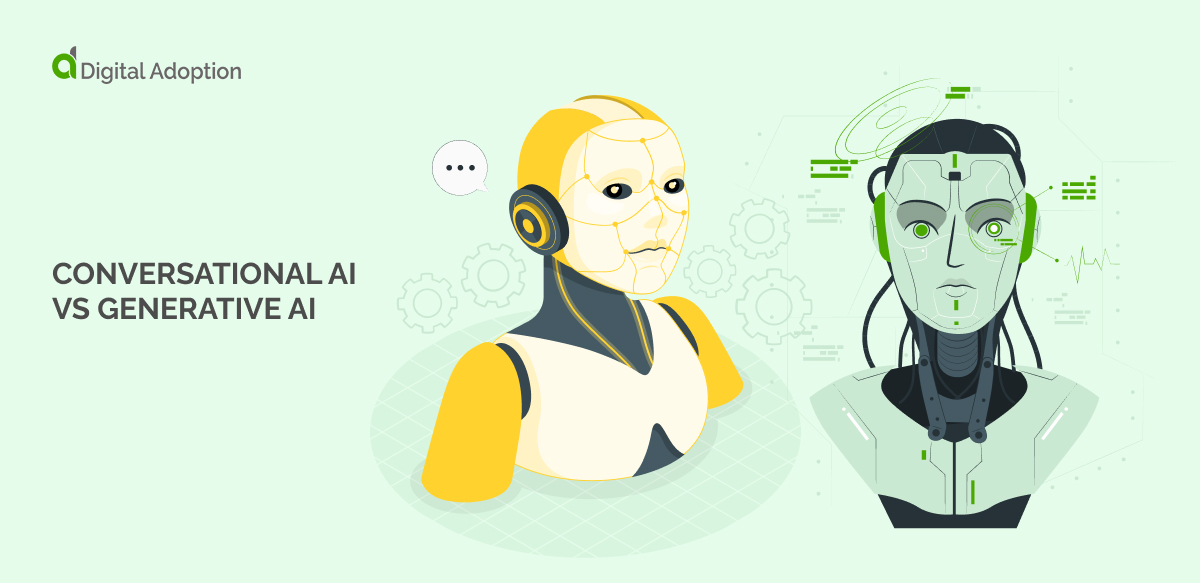Digital transformation vs. change management vs. digital adoption – what’s the difference?
In this article, we’ll look at these concepts in detail, including:
- The difference between these three ideas
- How they are related
- Why they are so important for businesses to understand
First, however, we should have working definitions for each term.
Digital Transformation vs. Change Management vs. Digital Adoption
These terms are related, but certainly different.
Here are some concise definitions of each:
- Digital Transformation – The organizational changes and transformations resulting from digital disruption and transformation. These changes include the adoption of new tools, cultural change, changes to business processes, and more.
- Change Management – The management discipline focuses on managing and implementing organizational changes. This discipline tends to focus driving organizational change by motivating, training, and mobilizing employees.
- Digital Adoption – Organizations that integrate new digital tools into their business environment. True digital adoption is focused not just on software deployment, but on maximizing the value of that software.
Today, many businesses are undergoing all three processes.
Understanding how they work together is essential for businesses that want to earn the most from their digital investments.
Digital Transformation in Detail
Digital transformation is part of today’s digital revolution.
The digital revolution is fueling transformation that deeply affects businesses, the way we work, and our daily lives.
For businesses, this means that they must adapt and transform in order to stay competitive.
Digital transformations can impact:
- The technology used in a business.
- The workforce.
- Business processes and operations.
- The organizational culture.
Among other areas.
Common aims of digital transformation include:
- Increasing business efficiency.
- Exploiting growth opportunities.
- Enhancing customer value.
- Improving business strategy.
- Increasing employee productivity.
In short, digital transformation refers to organizational changes that help companies leverage technology to adapt, stay modern, and stay profitable.
Digital Adoption in Detail
The aim when adopting new technology should be to maximize the value of that investment – not merely install it.
Unless employees are proficient and engaged, they won’t be productive.
This is how digital adoption differs from other terms, such as technology adoption.
Digital adoption aims at:
- Using technology to its fullest extent. Software is only profitable if it is used. When adopting new software, organizations should focus on improving employee proficiency, productivity, and engagement.
- Streamlining the digital workflow. The better an organization can integrate tools into the workplace, the more efficient the workplace will be. A streamlined digital workflow improves productivity, efficiency, as well as the overall workplace experience.
- Maximizing the returns and value of a software platform. With the right adoption approach, employees can become more skilled and more productive. This results in higher returns on the investment in a software platform.
Ultimately, digital adoption is aimed at improving and enhancing the profitability of digital tools.
Digital adoption platforms (DAPs), for instance, are solutions that help streamline the adoption process through improved onboarding and training.
Why Change Management Is So Important
Change management is a profession designed to implement, organize, and optimize organizational change programs.
Today, when digital transformation is the norm, change management has become important.
Effective change management can:
- Coordinate, manage, and streamline change projects. Organizational change projects such as digital transformation must be managed effectively. Change management is tasked with coordinating all involved parties, overseeing change projects, and ensuring they meet their objectives.
- Improve the results of digital transformation and adoption efforts. Digital transformation and other organizational change projects can be difficult for anyone involved. Change managers help streamline the process, improving project outcomes, and getting better results from digital transformation efforts.
- Overcome obstacles. Change managers also address and mitigate obstacles to organizational changes. These obstacles can range from employee resistance to budget constraints to technical barriers.
To name just a few benefits.
As mentioned, change management is a discipline that drives change from the individual level.
Namely, change managers focus on areas such as:
- Earning employee trust and support. Employee resistance is a common obstacle to change. Change management specifically focuses on engaging employees and earning their support – a necessary step to fueling successful transformation.
- Minimizing employee resistance and friction. Fear and mistrust are common emotions that cause employees to resist change. Change managers employ a variety of tactics, such as effective communication and employee training, to minimize that resistance and boost productivity.
- Providing employees with the training and skills they need to succeed. With digital adoption and transformation, training is a must. The right training solution (such as digital adoption platforms) can streamline change, reduce time-to-competency, and improve employee performance.
Ultimately, the right change management approach can mean the difference between success and failure.
Final Thoughts
Digital transformation vs. change management vs. digital adoption … clearly they are different concepts.
However, as we have seen, they are all closely related.
And for businesses that want to stay modern, relevant, and competitive, they are all important.
Digital transformation refers to changes aimed at improving efficiency, profitability, and business value by leveraging new technology.
Digital adoption and change management – which both focus on maximizing the value of such changes – are crucial to the success of any digital transformation efforts.

 FACT CHECKED
FACT CHECKED













